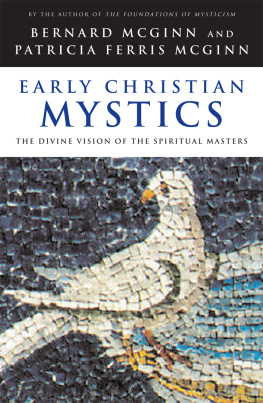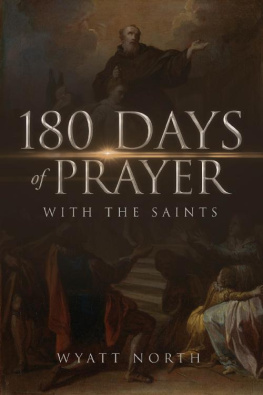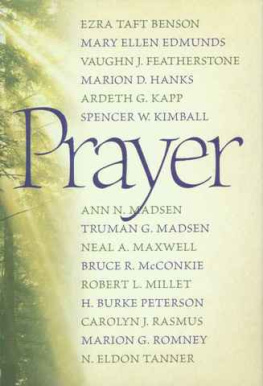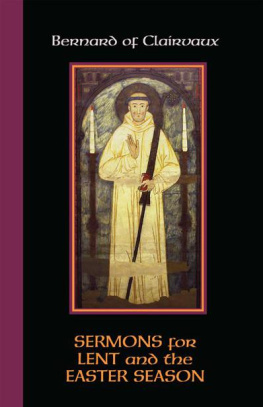MONASTIC WISDOM SERIES: NUMBER TWENTY-EIGHT
I Am the Way
MONASTIC WISDOM SERIES
Simeon Leiva, OCSO, General Editor
Advisory Board
| Michael Casey, OCSO | Terrence Kardong, OSB |
| Lawrence S. Cunningham | Kathleen Norris |
| Patrick Hart, OCSO | Miriam Pollard, OCSO |
| Robert Heller | Bonnie Thurston |
MONASTIC WISDOM SERIES: NUMBER TWENTY-EIGHT
I Am the Way
Stages of Prayer
in Saint Bernard
Maureen F. McCabe, OCSO
Foreword by John Sommerfeldt

Cistercian Publicatons
www.cistercianpublications.org
LITURGICAL PRESS
Collegeville, Minnesota
www.litpress.org
A Cistercian Publications title published by Liturgical Press
Cistercian Publications
Editorial Offices
Abbey of Gethsemani
3642 Monks Road
Trappist, Kentucky 40051
www.cistercianpublications.org
Unless otherwise noted, Scripture texts in this work are taken from the New Revised Standard Version Bible 1989, Division of Christian Education of the National Council of the Churches of Christ in the United States of America. Used by permission. All rights reserved.
All quotations from works published by Cistercian Publications are reprinted with permission.
2012 by Order of Saint Benedict, Collegeville, Minnesota. All rights reserved. No part of this book may be reproduced in any form, by print, microfilm, microfiche, mechanical recording, photocopying, translation, or by any other means, known or yet unknown, for any purpose except brief quotations in reviews, without the previous written permission of Liturgical Press, Saint Johns Abbey, PO Box 7500, Collegeville, Minnesota 56321-7500. Printed in the United States of America.

Library of Congress Cataloging-in-Publication Data
McCabe, Maureen F.
I am the way : stages of prayer in Saint Bernard / Maureen F. McCabe.
p. cm. (Monastic wisdom series; no. 28)
ISBN 978-0-87907-028-1 ISBN 978-0-87907-476-0 (e-book)
1. Bernard, of Clairvaux, Saint, 1090 or 91-1153. 2. Contemplation.
I. Title.
BV5091.C7M37 2012
248.2dc23
2011041792
For the Cistercian Friends
of Mt. Saint Marys Abbey, Wrentham,
who have taught me so much
about prayer and love
Foreword
As we learn by experience how much we need the spirituality of others, we seek out those who can aid us in our journey to God. Mother Maureen has illuminated the path by relating the riches gained through her own experience, an experience enriched by her sensitive reading of Saint Bernard the spiritual guide.
Often in my many travels to the monasteries of America and Europe I have heard my monastic sisters and brothers express their discomfort in reading Bernard. His thought, they say, is too difficult to relate to my real, everyday life. They are right: Bernard is indeed difficult.
A large part of our difficulty in understanding Bernard is due to the many myths which have grown up about him. The first myth is that Bernard condemned his brilliant contemporary Peter Abelard for attempting to apply reason or logic to matters of faith. But Bernards complaint was that Abelard had applied logic to questions beyond logiclike the doctrine of the Blessed Trinityand that that application of logic was illogical. Bernard gave the church deep insights into her doctrine, most often by the logical analysis of Scripture.
A related myth is that Bernard believed that the only certain way to knowing the truth about God, humankind, and nature was through contemplationa direct experience of the reality of God. Bernard was indeed a contemplative and urged his brother monks and all of us to be open to Gods gift of contemplative experience. But he also subscribed to other means of knowing the truth: the certainty attained by faith, for instance, and the charismatic knowledge imparted directly to the mind as a gift of the Holy Spirit. Bernard also showed himself a humanist who saw beauty, especially the beauty of language, as an effective way of experiencing and sharing the reality of God and his world. Perhaps more surprising, Bernard also believed that philosophy too could lead to truth and the Truth who is God.
A third Bernardine myth is that our saint ignored the world of nature as a distraction from spiritual pursuits. Not at all! The universe in which Bernard dwelled was energized, he was sure, by the creating and redeeming power of love, the love of a Creator God who is Love. All of creation, both material and spiritual, is immersed in the sea of Gods overwhelming goodness and indwelling love.
Contrary to still another myth about him, Bernard did not believe that humans were totally incapacitated by original sin. The truth is that Bernard was convinced that human beings, though flawed by self-centeredness, are basically good because God created them good. He saw them capable of the happiness for which they all long and for which God destines them. And for Bernard the body is so essential to human nature and its perfection that we cannot fully enjoy the beatitude of heaven until our souls are reunited with our bodies, glorified at the end of time.
Yet another myth is that Bernard followed Saint Augustines views in all things. Bernard did depend greatly on Augustines thought, but he differed radically on some questions of great importance to us. Augustine, for instance, saw the human soul as having three principal powers: the intellect for knowing, the will for choosing, and the memory for remembering. But, for memory in the Augustinian scheme, Bernard substituted a wholly different power: the affectus, which functions in human attachment, emotion, feeling, and passion. Passion he did not reject as evil, and Augustines aversion to sex he rejected out of hand. We all know of Bernards Sermons on the Song of Songs, in which, over a period of some eighteen years, he lyrically portrayed the union of human lovers as a convincing symbol of Christs passionate love for each and every human being.
Bernard did not believe, as has been stated even in recent books, that the monastic life was by far the highest vocation. Rather, hesaw each person and every vocation having a place and a role in a process very much like a pilgrimage. That pilgrimage has as its goal individual fulfillment and the perfection of the whole People of God.
It has taken me nearly seventy years of study even to begin to understand the richness of Bernards teaching on the spiritual life. Mother Maureen has helped you and me as her readers to profit, virtually without effort, from following Bernards prayerful path to God.
Surely there is no better way to learn how to pray more deeply than to consult a guide whose prayer life is already profound. Mother Maureen has enriched her prayer life by listening to Saint Bernard. In the same way, we who long to pray more profoundly are able, through this book, to listen to one whose prayer life mirrors Bernards and has brought her before the face of God.
I believe introductions should be short. This is especially true of this book. I do not want to delay your feasting on its riches.
John Sommerfeldt, PhD
University of Dallas
Abbreviations
| CF | Cistercian Fathers Series |
| CS | Cistercian Studies Series |
| Conv | Bernard, Sermons to Clerics on Conversion |
| Csi | Bernard, Five Books on Consideration |
| Dil | |
Next page













